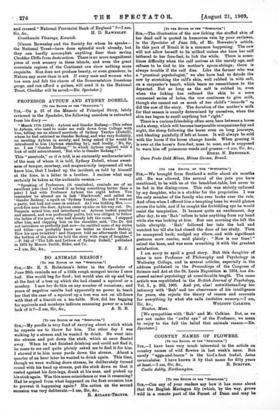[To THR EDI rim or TIII 5P10TAT0R:1 Sni, — We brought from
Scotland a collie about six months old. He was allowed, like several of the pets you have mentioned, to be with us at the breakfast-table, but never to be fed in the dining-room. This rule was strictly enforced by my daughter, who is a stickler for the proprieties. I was the only member of the family who ever broke over the rule. And often when I offered him a tempting bone lie would glance across the table, and if be caught the forbidding eye he would resist the temptation. It became quite an excitement, day after day, to see ' Rab ' refuse to take anything from my hand while she was looking at him. But one morning she left the table abruptly. 'Ralf followed her into the hall and watched her till she had closed the door of her study. Then he scampered back, nudged my elbow, and with significant gestures more canino, said plainly : "Now is our time !" seized the bone, and was soon crunching it with the greatest satisfaction.
I am sorry to spoil a good story. But this daughter of mine is now Professor of Philosophy and Psychology in Wellesley College, and in several articles, especially in the address published in the Proceedings of the Congress of Science and Art at the St. Louis Exposition in 1904, has dis- cussed animal psychology at considerable length. The same article was republished in the British Journal of Psychology, L, p. 262, 1905. And yet, alas! notwithstanding her intimacy with ' Rab' and her observance of his intelligence for years, she rejects the theory of reason and accounts for everything by what she calls imitative memory.—I am, [We sympathise with Rab' and Mr. Calkins. But, as we are not under the "awful eye" of the Professor, we mean to enjoy to the full the belief that animals reason.—En. Spectator.]






































 Previous page
Previous page